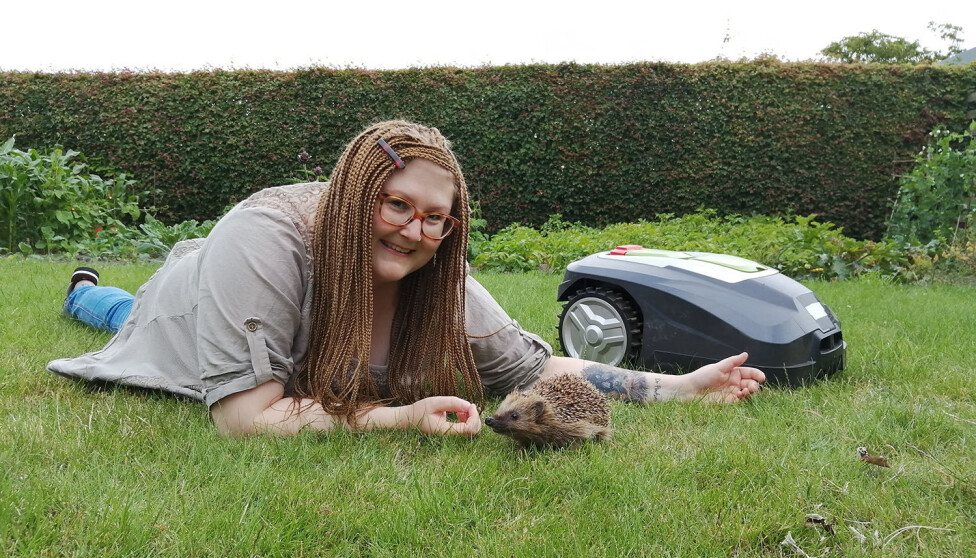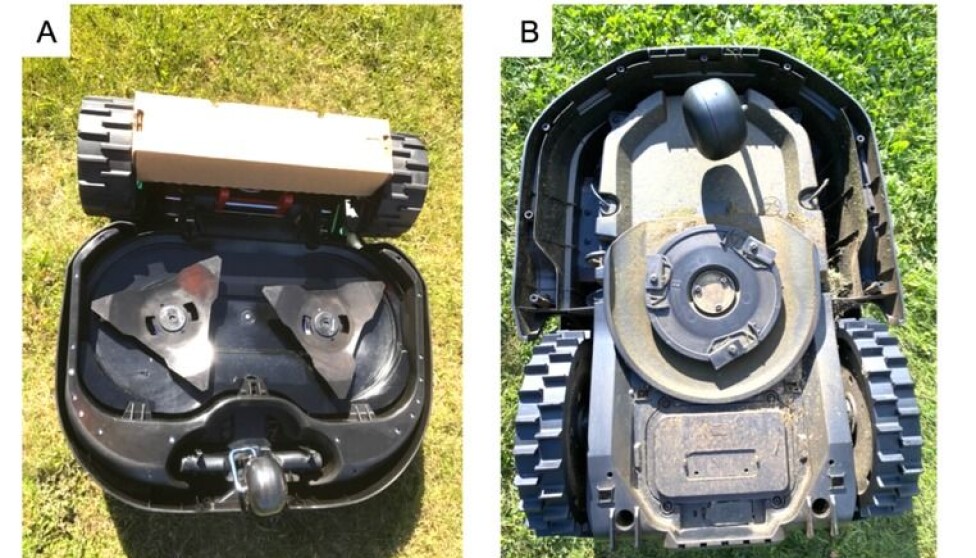Researchers' Zone:

Do robotic lawn mowers hurt hedgehogs? Dr Hedgehog has the answer
Are robotic lawn mowers really dangerous to hedgehogs? An important question I decided to investigate, and the answer depends entirely on which model of robotic lawn mower that runs in your garden.
Every spring and summer, pictures of injured hedgehogs circulate in the press and on social media, encouraging garden owners to stop using robotic lawn mowers in order to prevent causing such harm.
Injured hedgehogs are frequently admitted to hedgehog rehabilitation centres with different types of cuts and wounds, which are sometimes even lethal.
Some injuries are consistent with known risks to hedgehogs in the form of garden trimmers and dog bites. However, although not rigorously quantified or documented, a concern has arisen in several European countries that an increasing number of cases may have been caused by robotic lawn mowers.
As the population of European hedgehogs is in decline all over Europe, it is very important to identify and investigate the factors responsible for this decline to improve the conservation initiatives directed at this species. But are robotic lawn mowers really to blame for the injuries?
I decided it was time to stop guessing and start investigating! As I am the only full-time hedgehog researcher in Denmark, I have earned the nickname Dr Hedgehog in the Danish media, and with a title like that comes a massive responsibility to research and make a difference for the conservation of hedgehogs.
This was why I endeavored to solve the mystery.
If you would rather watch than read, Sophie Lund Rasmussen gives a 5 minutes presentation of her findings in this video. (Video: Dorthe Madsen and Rasmus Jensen)
Tests on dead hedgehogs
In collaboration with my colleagues at Aalborg University, Natural History Museum of Denmark and WildCRU University of Oxford, I spent my summer holiday last year conducting the first scientific study on the effects of robotic lawn mowers on hedgehogs.
We tested 18 different models of robotic lawn mowers with different technical features representing the various types of machines available on the European market.
The robotic lawn mowers were tested in collision with dead hedgehogs. The dead hedgehogs in the study were collected from hedgehog rehabilitation centres, where sadly they had been too poorly to save.
Each robotic lawn mower was tested 12 times; with four dead hedgehogs representing four different weight classes, each tested in three different positions.
To my great surprise the results showed that all the robotic lawn mowers had to physically interact with the hedgehogs in order to detect them.
Huge differences between the machines
Some machines drove up to the hedgehogs and gave them a light nudge and changed directions, as one would expect after having witnessed a robotic vacuum cleaner avoiding an obstacle on the floor.
Other machines did not detect the hedgehogs and continued to drive, running over the dead hedgehogs.
Fortunately, some of these machines lived up to the standard safety regulations and stopped when the hedgehog was lying underneath the machine.
But other machines kept on running, causing serious damage to the dead hedgehogs.
To sum up: some of the robotic lawn mowers were not dangerous to the hedgehogs, but others were!
An alarming discovery
As an owner of a robotic vacuum cleaner, which navigates intelligently around my son’s toys without eating them, I was honestly shocked to discover how contrastingly the robotic lawn mowers performed in our tests.
Especially since I have previously witnessed how the robotic lawn mower running in my friends’ garden was able to avoid footballs and branches on the lawn.
As a true hedgehog enthusiast it was horrible to experience how some of the robotic lawn mowers practically mutilated the dead hedgehogs in our tests.
However, at the same time, other models performed quite well in our tests and did not appear to cause any damage to the dead hedgehogs. In the light of the results, it suddenly makes sense that the opinions on the danger posed to hedgehogs by robotic lawn mowers, have been so diverse.
Hedgehog friendly robotic lawn mowers?
Our investigation of the 18 different models of robotic lawn mowers clearly showed, that technical features such as pivoting blades, which fold away behind a protective plate when hitting something harder than grass, skid plates and front wheel drive significantly increased the safety index of the machines, making the machines less harmful to hedgehogs.
In general, we discovered that the presence of pivoting blades increased the safety for the hedgehogs. However, it is important to mention that some of the robotic lawn mowers tested with pivoting blades were still harmful to the dead hedgehogs.
Have a look at the scientific article if you wish to learn how each robotic lawn mower performed in the tests (see in particular figure 3).
In the light of the results the next important step is to communicate the new insights to the manufacturers, enabling them to improve future machines to become more hedgehog friendly.
There are, however, still questions we need to answer.

Would live hedgehogs just run away?
Our research does not definitively answer the question of how dangerous these mowers are to live, wild hedgehogs.
The results show that there is a potential risk, but so far we have not had the opportunity to test how living hedgehogs react towards an approaching robotic lawn mower, which makes it difficult to quantify the true risk to live hedgehogs in the wild.
The majority of hedgehogs may simply run away and thereby avoid collisions. Healthy hedgehogs are perfectly able to outrun a robotic lawn mower – they have surprisingly long legs hidden underneath all those spines.
The natural defense mechanism of the hedgehogs, including around 5,000 spines, is typically to freeze completely, after which they decide whether to curl up or run away.
If they should choose the first strategy, to curl up, they would be more exposed to the models of robotic lawn mowers which do not detect the hedgehogs and change directions, as they are supposed to.
Consumer guidance
Even though the study has provided important knowledge about the threat that some machines potentially pose to hedgehogs, it is still too early in the process to name particular robotic lawn mowers as officially safe for hedgehogs.
Especially since we have not had the opportunity to test every model available on the market. But we will continue our work on this subject.
If you are curious to see whether your robotic lawn mower model was among the tested, and how it performed in the tests, you can find the answer here.
By documenting how live hedgehogs typically react to an approaching robotic lawn mower (which has been disarmed and will be stopped before reaching the live hedgehogs), we will be able to develop standardised tests on robotic lawn mowers.
We hope to establish a labelling system guiding the garden owners to purchase hedgehog friendly robotic lawn mowers.
Lastly, it is our ambition to develop a hedgehog crash test dummy to be used in future standardised tests determining whether new models of robotic lawn mowers are safe to hedgehogs.
Disclaimer: The live hedgehogs did not take part in the tests and were only out during the day as they were at a rescue centre after having received care. They were released back into the wild the same evening.
Sources:
- Sophie Lund Rasmussen's profile (Aalborg University)
- Sophie Lund Rasmussen's profile (WildCRU, University of Oxford )
- 'Wildlife Conservation at a Garden Level: The Effect of Robotic Lawn Mowers on European Hedgehogs (Erinaceus europaeus)'. Animals, 2021. DOI: 10.3390/ani11051191
- 'Hedgehog Street - 10 tips for encouraging hedgehogs in your neighbourhood'





